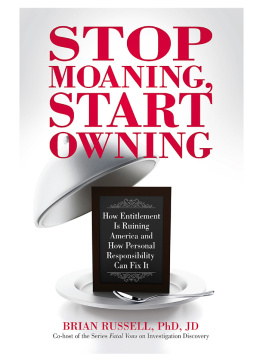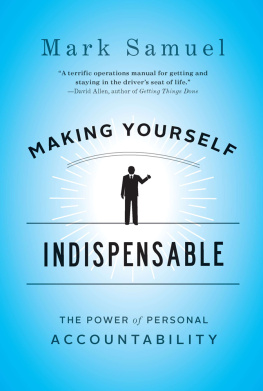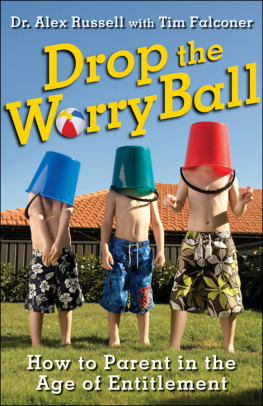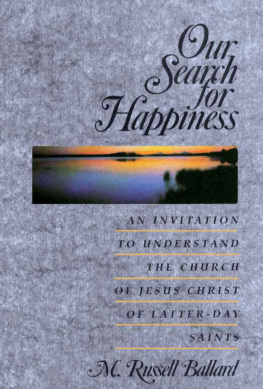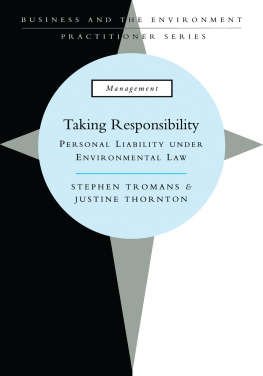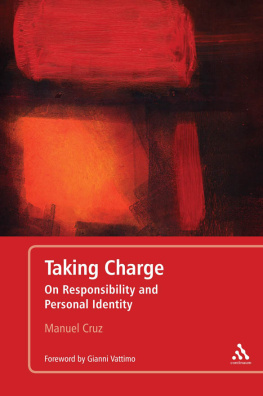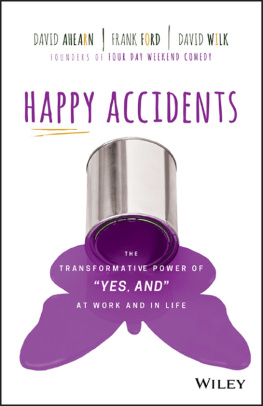Baby boomers, Generation Xers, Generation Yers, Millennialshave I forgotten anyone?wake up! The problem isnt themit is you. In this book, Dr. Brian Russell explains why life is what you make it, not what you can get others to provide you. You are entitled to nothing. This book is like a condensed and cost-effective therapy session. Read it. Heed it. Find your contentment.
I recommend this book for both lawyers and nonlawyers. As an attorney and father of three, I believe this book will stimulate discussion concerning entitlement versus personal responsibility.
Read this important new book, give copies to all your kids and anyone else who wants to read about what needs fixing in the U.S.A.
Brian Russell has an incredible amount of experience when it comes to problem solving. His book wonderfully highlights the importance of taking personal responsibility in order to lead a more productive and successful life.
Health Communications, Inc.
Deerfield Beach, Florida
www.hcibooks.com
Library of Congress Cataloging-in-Publication Data
is available through the Library of Congress
2015 Brian Russell
ISBN-13: 978-07573-1876-4 (Paperback)
ISBN-10: 07573-1876-2 (Paperback)
ISBN-13: 978-07573-1877-1 (ePub)
ISBN-10: 07573-1877-0 (ePub)
All rights reserved. Printed in the United States of America. No part of this publication may be reproduced, stored in a retrieval system, or transmitted in any form or by any means, electronic, mechanical, photocopying, recording, or otherwise, without the written permission of the publisher.
HCI, its logos, and marks are trademarks of Health Communications, Inc.
Publisher: Health Communications, Inc.
3201 S.W. 15th Street
Deerfield Beach, FL 334428190
Cover and interior design by Lawna Patterson Oldfield
ePub created by Dawn Von Strolley Grove
Contents
THANKS TO MY PARENTS, Kathleen and Timothy Russell, for instilling personal responsibility in me; to Dr. Richard Garland, for mentoring me as a psychologist; to radios Dr. Laura Schlessinger, for inspiring me to make a difference on a national scale; and to TVs Bill OReilly for showing me how to argue my case before a national audience.
Additional thanks to my agent, Claudia Menza, agent/publicist Annie Scranton, and editor Christine Belleris for believing in this book and for all of their assistance in bringing it to you.
IN MY YEARS AS COHOST of the series Fatal Vows on Investigation Discovery, Ive spotlighted people at their worst, those whove traveled far down profoundly destructive paths of their own choosing. As my colleague Dr. Drew Pinsky likes to remind me whenever I appear on his show, the cartoon series South Park has dubbed shows like mine informative murder porn, implying that they dont have any value beyond voyeurism and Schadenfreude. I really dont think thats true, though. I always argue that many important lessons for everyday life, marriage, parenting, personal safety, and so on can be drawn from extreme cases with spectacularly bad endings. Perhaps chief among these lessons is how most bad endingsspectacular or notcould be prevented if only the people involved had made better choices earlier about their own behavior and about behavior theyve tolerated from others.
In recent years, theres been an awful lot of moaning from an awful lot of unhappy Americans accompanied by an awful lot of excuses as to why they re not responsible for their unhappiness, economic circumstances, or behavior. You may have heard people make excuses for themselves, or maybe youve even said some of these things yourself. Im embarrassed to say, many of these have been served up on silver platters by some of my fellow psychologists and lawyers:
I havent succeeded because Ive been oppressed by [a demographic group, corporate America, the rich].
Ive abused [my spouse, my kids, both] because I had a bad childhood.
Im [obese, failing school, addicted] because I have a disease.
I was prevented from knowing right from wrong by [a mental illness, violent video games, too many Twinkies].
These are just a handful of examples. An exhaustive listfrom felons, philanderers, and freeloaders to everyday Americans with everyday gripes and everything in betweencould fill this entire book. In short, America has become a nation with far too many narcissistic, self-entitled, excuse-making moaners who simply refuse to own their problems and the solutions thereto. But it wasnt always that way.
The United States was founded and built by rugged individualists, people who supremely valued personal freedomthe freedom to develop their ideas, strengths, skills, and talents to the best of their abilities in the pursuit of better lives for themselves, their families, and future generations. They were willing to take profound risks, like leaving their home continents for distant and unknown shores, like standing up to and defeating the most formidable foes of their timesmore than once (e.g., Great Britain, Spain, Nazi Germany... )and they literally tore their nation apart and pulled it back together again to eradicate the scourge of slavery. They did all that in the name of freedom. And in their unrelenting quest for freedomnot just political and economic freedom, but also freedom of religion, expression, and associationthey were successful beyond the founders wildest imaginations. In the blink of an eye in the grand timeline of human history, they created a nation that surpassed all others in its industrial, cultural, and intellectual productivity; in its prosperity and peacekeeping power; and, yes, in its personal freedom, making it the single greatest nation in human history in which to pursue happiness.
The people who founded and built America understood that thats all their precious freedom meantfreedom to pursue happinessand that none among them was guaranteed or entitled to actually capture it. They also understood that freedom and personal anarchy werent the same, and that maximum personal freedom required reasonable limits so that each citizens exercise of freedom wouldnt impinge or infringe upon the freedoms of others. Furthermore, they understood that such reasonable limits were best self -imposed, that it would be both impractical and oppressive to have a society in which behavioral limits were forced upon individuals by the state. In other words, they understood that personal freedom and personal responsibility went hand in hand.
I think they also tended to gauge happiness differently than many Americans do today. Think about the unemployed and underemployed professionals who went to work in coal mines to feed their families during the Great Depression. Think about our Greatest Generation of Americans who banded together and sacrificed profoundly to preserve not just their own freedom but also the freedom of others in distant lands during World War II. In contrast to many of todays Americans, I think they tended to gauge happiness in relation to their contributions to things larger than themselvesmost centrally to their families, then rippling outward to their churches, professions, businesses, communities, country, and even their world.

